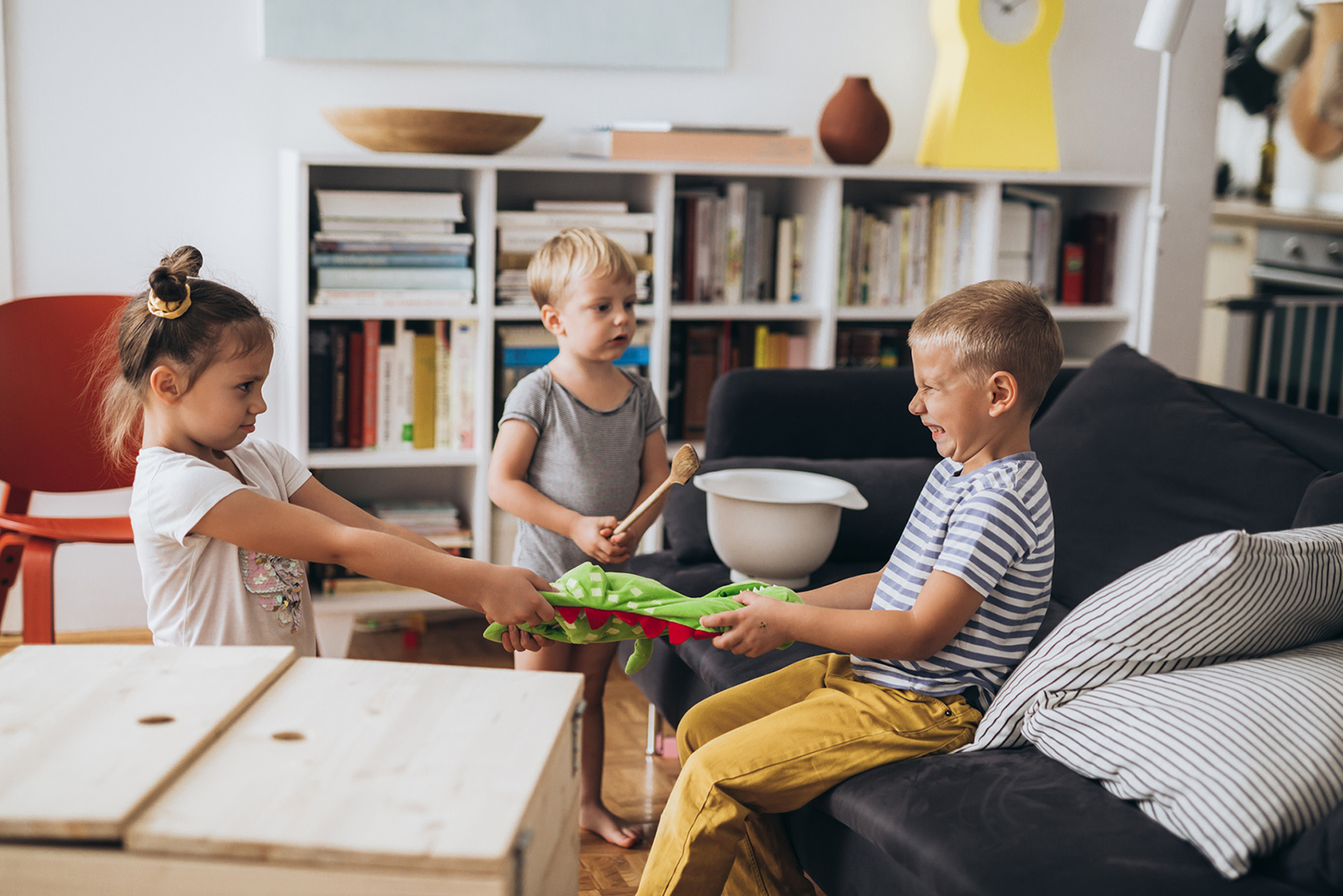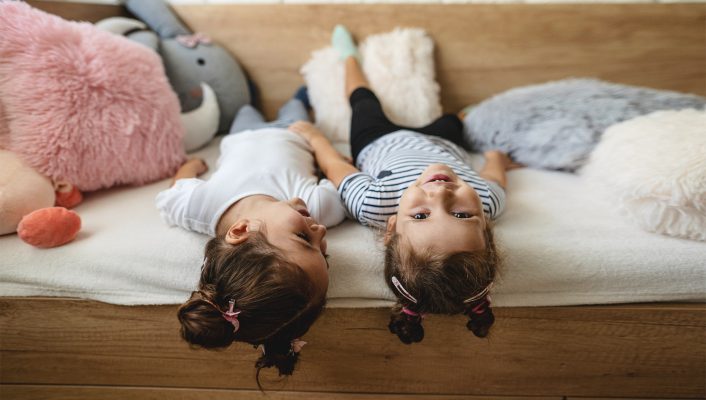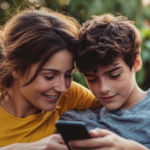
Ani chwili spokoju, czyli co robić, kiedy dzieci ciągle się kłócą?
Spis treści:
Norma dnia codziennego, czyli dziecko o wszystko się kłóci
Każdy z nas ma chwile, kiedy wybucha złością. Także dzieci mają swoje emocje, z którymi zwyczajnie sobie nie radzą. Jako rodzice powinniśmy wspierać je w wyrażaniu emocji, nauce sztuki mediacji i pokojowego rozwiązywania sporów. Spory i kłótnie są dobrym poligonem doświadczalnym do takiej nauki. Dzięki nim dzieci ukazują swoje emocje, lęki i dążenia, ale także wzmacniają poczucie własnych granic i uczą się ich bronić.
Doskonale znane nam wszystkim awantury dziecka o wszystko to nic innego jak jego próby stawiania granic. Choć z naszego punktu widzenia reakcje dziecka mogą być zdecydowanie na wyrost, każda, nawet najbardziej błaha próba ingerencji w usankcjonowany przez malucha stan posiadania wywołuje gwałtowną potrzebę obrony.
Janusz Korczak jest autorem przełomowego w historii postrzegania psychiki dziecka zdania: „Nie ma dzieci, są ludzie”. Dzieci się kłócą, bo są ludźmi. Wszelkiego rodzaju waśnie są nieodłączną formą ludzkiej aktywności.
Dlaczego dzieci się kłócą?
Pierwszą „linią frontu” dla dziecka jest jego rodzeństwo. Rodzice – mimowolni świadkowie tych awantur – z bezradnością patrzą na emocje towarzyszące sporom, takie jak: poruszenie, złość, rozczarowanie czy zniecierpliwienie. Jednak kłótnie są całkowicie normalne i konieczne dla prawidłowego rozwoju społecznego i emocjonalnego dzieci.
– Chociaż mogłoby się wydawać, że konflikty między dziećmi wybuchają bez powodu, pamiętajmy, że to, co dla rodziców jest błahostką, dla maluszków stanowi duży problem. Według nich najlepszym rozwiązaniem jest sytuacja, kiedy im jest dobrze, a rywal ponosi porażkę – tłumaczy Aleksandra Litwiniuk z Centrum Edukacji i Wspomagania Rozwoju Insignis w Lublinie.
Małe dzieci nie wiedzą jeszcze, czym są negocjacje lub kompromis, i nie potrafią się porozumieć za pomocą spokojnej rozmowy. Dopiero z czasem rozwijają umiejętność współodczuwania czy dzielenia się z innymi np. zabawkami.
Dlaczego dzieci się kłócą? Powodów może być mnóstwo: ochota na tę samą zabawkę w tej samej chwili, obrona swojego terytorium, czyli kącika do zabaw albo swojego pokoju, potrzeba zwrócenia na siebie uwagi dorosłych.
Pretekstem do kłótni może być także:
- nuda – dzieci nie potrafią skoncentrować się dłużej na jednej czynności, dlatego konflikty stanowią rozrywkę,
- zmęczenie i drażliwość,
- przebodźcowanie (hałas, szum, ostre światło, dym papierosowy, itd.),
- kłopoty w szkole/przedszkolu – dziecko może odreagowywać swoje frustracje na domownikach,
- powielanie schematów z domu rodzinnego – jeżeli mama i tata nie potrafią ze sobą spokojnie porozmawiać, tylko bezustannie się kłócą, to dziecko także będzie konfliktowe.
– Całkowita eliminacja sprzeczek między rodzeństwem nie jest możliwa. Zwróćmy także uwagę na swoje własne zachowanie – niekorzystne i konfliktogenne jest porównywanie dzieci, faworyzowanie jednego z dzieci, zachęcanie do niezdrowego współzawodnictwa. Rodzice powinni podkreślać indywidualne cechy każdego dziecka i traktować każde sprawiedliwie, to znaczy – według zasady „każdemu według potrzeb” – dodaje specjalistka.
Kłótnie rodzeństwa – jak się zachować?
Dzieciom trzeba pozwolić na kłótnie. W większości przypadków są w stanie samodzielnie znaleźć rozwiązanie, wystarczy im tylko nie przeszkadzać.
Świetnym pomysłem jest ustalenie jasnych zasad obowiązujących w domu. Muszą być one zrozumiałe dla każdego członka rodziny, a rolą rodziców jest konsekwentne postępowanie.
– Dziecko powinno znać granice i wiedzieć, że nie wolno bić, gryźć ani szczypać, szarpać za włosy, itd. W momencie wystąpienia konfliktu na początku warto obserwować rozwój sytuacji. W wielu przypadkach może się okazać, że nasza interwencja nie będzie konieczna – mówi Aleksandra Litwiniuk.
Jeżeli zauważysz, że dzieciom trudno załagodzić spór, można podpowiedzieć im rozwiązanie, np.: „jeżeli chcesz pobawić się misiem siostry, pożycz jej swoją piłkę”. U starszych dzieci można odwoływać się do empatii: „jak byś się czuł, gdyby ktoś zabrał ci twoją ulubioną zabawkę?”. Doceniaj, kiedy dzieciom uda się rozwiązać konflikt i chwal maluchy za wszelkie przejawy chęci porozumienia się. Pozwól dzieciom na samodzielną naukę negocjacji i osiągania kompromisów.

Polecamy
Rodzeństwo bez rywalizacji – czy to możliwe?
Wielu rodziców ma nadzieję, że jeśli da dzieciom po równo uwagi oraz czasu, uda im się uniknąć rywalizacji między rodzeństwem. Często jednak usilne starania nie przynoszą efektów. Kiedy dzieci ze sobą walczą, rodzice uznają to za problem. Są zmęczeni i zamartwiają się, że rywalizacja jest objawem jakichś deficytów. Czy rywalizacja między rodzeństwem zawsze oznacza realną niechęć do siebie wzajemnie? Czy da się wychować rodzeństwo bez rywalizacji? Odpowiadamy.
Jak rozwiązywać kłótnie dzieci w szkole?
Konflikty szkolne są wpisane w codzienność, szczególnie sprzeczki czy złośliwości w gronie rówieśników. Społeczność szkolna to zbiorowisko osób pochodzących z różnych środowisk rodzinnych, wyznających różne wartości i zasady.
– Małe dzieci są przekonane, że inne osoby widzą, czują i rozumieją podobnie jak one, a tak oczywiście nie jest. Kiedy dochodzi do analizy konfliktu, jego bohaterowie odnoszą się do własnych intencji, własnego rozumienia problemu i są przekonani, że mając dobrą wolę, zachowują się dobrze. Nie uwzględniają różnic w postrzeganiu i rozumieniu rzeczywistości. Warto zwrócić uwagę, że to nie konflikty są problemem dzieci, ale sposoby ich rozwiązywania – mówi Litwiniuk.
Reakcja rodzica na szkolne spory powinna być uzależniona od skali problemu – jeśli konflikt jest niewielki, wystarczy porozmawiać na jego temat z dzieckiem w domu, poznać jego punkt widzenia i pozwolić mu wyładować emocje. Dzięki temu uczy się ono konstruktywnego rozwiązywania problemów międzyludzkich. Jeżeli konflikt jest poważny, zagraża bezpieczeństwu fizycznemu lub psychicznemu uczestników sporu, przydatna może być mediacja i konfrontacja z drugim dzieckiem i jego rodzicami. Pokazujemy wówczas dzieciom, że za działania i decyzje ponosi się konsekwencje.
Sposób rozwiązania sporu zależy od wieku dziecka – młodsze dzieci nie potrafią jeszcze kontrolować swoich emocji i tutaj pomoc rodzica jest niezbędna. Warto jednak pozwolić maluchowi na samodzielne rozwiązywanie sporów. Natomiast inaczej wygląda sytuacja w przypadku starszych dzieci.
Nastolatki często traktują próbę pomocy rodzica jako wtrącanie się w ich relacje z rówieśnikami. Są jednak momenty, gdy potrzebują wsparcia i zrozumienia tego, że okres dojrzewania sprzyja błędom w rozwiązywaniu konfliktów. Ważne, by młodzi ludzie czuli i wiedzieli, że rodzice służą wsparciem, traktują ich poważnie i starają się zrozumieć ich punkt widzenia.
Ważne są także oczekiwania dziecka, dlatego zamiast od razu reagować na każdą drobnostkę, pozwólmy dziecku na samodzielne zmierzenie się z problemem, ponieważ nie da się ich w życiu uniknąć. W razie potrzeby można omówić daną sytuację, angażować się w takim stopniu, jakiego potrzebuje i oczekuje dziecko.
W sytuacji szkolnej zawsze warto porozmawiać z nauczycielem, wychowawcą, pedagogiem szkolnym o danym konflikcie i ewentualnej pomocy rodzica w jego rozwiązaniu.
Co robić, gdy dziecko kłóci się z rodzicami?
Nie ma wątpliwości, że w sytuacji konfliktu z dzieckiem wielu rodziców boi się utraty kontroli i złych relacji ze swoją latoroślą. Takie myślenie obie strony stawia na przegranej pozycji.
Powodem do awantur z rodzicami może być poczucie, że dzieci nie mają w domu wystarczającej swobody czy możliwości podejmowania samodzielnych decyzji. Dzieci mogą nie akceptować nadmiernego (ich zdaniem) niepokoju i nadmiernego kontrolowania ich życia, innych poglądów. Punktem zapalnym może być także zazdrość o rodzeństwo, uwagę rodziców, ich miłość, bliskość i czas, a także zazdrość o rówieśników, ich zabawki i np. status społeczny.
Rodzice już od najwcześniejszych lat powinni przygotowywać dzieci do radzenia sobie w problematycznych sytuacjach. Konflikty są nieuniknione, ale bywają konstruktywne, a nawet twórcze. Warto rozmawiać o różnych rozwiązaniach, pokazywać, jak można dochodzić do konsensusu. Okazją do rozmów może być analiza konfliktów pojawiających się w życiu, w obejrzanym filmie, w przeczytanych książkach.
Warto także pokazać dziecku, jak powinno się bronić, gdy jest atakowane i do kogo może zwrócić się o pomoc, gdy samo nie jest w stanie poradzić sobie z rozwiązaniem problemu. Ważne by wiedziało, że zawsze może porozmawiać z rodzicem i zostanie wysłuchane.
Umiejętność słuchania i mówienia, akceptacja różnych przekonań, kształtowani empatii i szacunku dla siebie oraz „przeciwnika” stanowią wstęp do rozwiązywania trudnych sytuacji.
Priorytetem powinno być poszukiwanie rozwiązań uwzględniających potrzeby obu stron. Tylko wtedy wypracowane porozumienie będzie konstruktywne dla wszystkich.
Jak zapobiegać kłótni dzieci?
Nie istnieje recepta na to, jak reagować na spory wśród dzieci. Konflikty są potrzebne, sprzyjają rozwojowi emocjonalnemu i społecznemu brzdąców. Rodzic musi jednak czuwać, aby nie dopuścić do użycia siły fizycznej. Jeśli to możliwe, można próbować unikać sytuacji wywołujących kłótnię między dziećmi – np. warto spytać starszego malucha, czy zechce oddać zabawki swojej młodszej siostrzyczce. Na początku dziecko może nie być zainteresowane, okazywać zazdrość o miłość rodziców, ale za jakiś czas samo obdaruje młodszego maluszka zabawką. Trzeba dać dziecku prawo do decydowania o sobie.
Warto także poszukać sposobów, by naukę sztuki prowadzenia sporów włączyć w cały cykl wychowania naszych dzieci. W tym celu warto wspierać je w treningach wyrażania emocji.
- Rozmawiajmy z dziećmi o emocjach, aby mogły powiedzieć, co czują w danym momencie.
- Uczmy je, jak rozumieć konsekwencje działania, słów, zachowania.
- Pozwólmy na samodzielne proponowanie różnych rozwiązań w trudnych sytuacjach czy wyzwaniach życiowych.
- Pilnujmy, aby dzieci nie szukały winy u innych, w sytuacji, pogodzie itd. – mogą nazywać swoje emocje w danej chwili – „ja czuję się…, kiedy ty…”.
- Korzystajmy z zabaw wyciszających.
- Uczmy dzieci przepraszania.
- Doceniajmy wszystkie próby porozumienia się.
Nie można oczekiwać, że starsze dziecko zawsze będzie ustępowało młodszemu, bo młodsze zaczną taką sytuację wykorzystywać, np. do manipulacji rodzicem. Można odwrócić uwagę małego dziecka, np. zainteresować je widokiem za oknem czy inną zabawą.







































